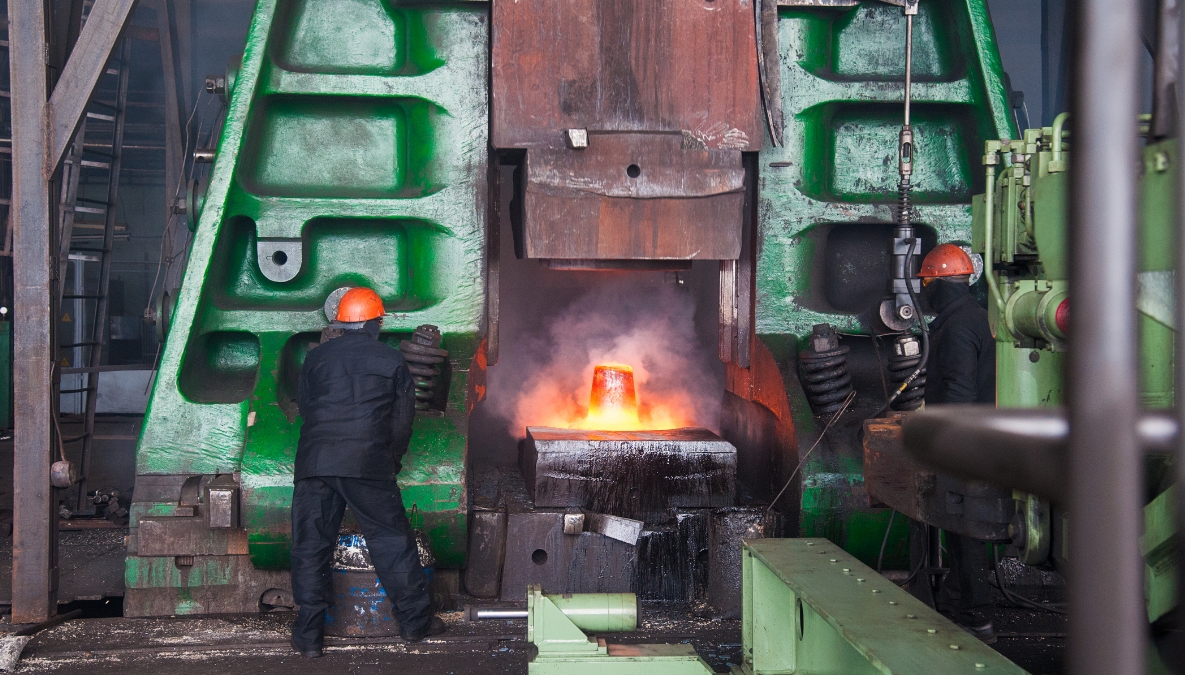The Equipment We Use to Provide High-Quality Forgings
The Equipment We Use to Provide High-Quality Forgings
At CanForge we use a variety of equipment to create our high-quality forgings – from hammers and presses to upsetters and ring rollers.
In today’s blog, we’ll be taking a look at these various types of equipment and how North America’s top forging supplier continues to use them in their day-to-day forging process.
Hammers
At CanForge, forging hammers are used to form the metal between two dies. The first half of the die is attached to the stationary anvil, while the second part is attached to the hammer. The material
is then placed in the lower die and rhythmically beaten into shape using controlled and high-pressure blows.
Hammers use impact strain to deform the metal and demonstrate a driving force of up to 50,000 pounds.
Forging hammers are especially beneficial when forging thin components and heavy parts, made of steel, Ni-based alloys, or titanium.
There are several types of forging hammers commonly used in open die and closed die forging:
- Board Hammers: Also referred to as board drop hammers, these hammers operate exclusively by gravity. The ram is set to a predetermined height, which cannot be modified between blows.
- Air-Lift Hammers: The ram is raised by air cylinders. On some, the height can be varied with each stroke.
- Steam or Air-powered Hammers: The hammer is raised by either steam or air and is powered down onto the workpiece by pressurized steam or air. These hammers are the largest and most powerful among conventional forging hammers, which is why our Closed Die plant is equipped with double-action air hammers.
Presses
Presses are another type of equipment used here at CanForge. In fact, our Open Die plant operates Ontario’s largest open die pull-down hydraulic forging press (3300 tons), along with two other
open die presses of 1200 and 600 ton capacity respectively.
These presses demonstrate a driving force of up to 50,000 tons and work by squeezing the metal into shape vertically, using controlled high pressure. They can be used for all alloy groups but are
specifically preferred when working with alloys that require slow deformation rates.
There are 4 main types of forging presses:
- Mechanical Press: Powered by a motorized flywheel that transfers energy into a ram, which slowly applies pressure to the die. Widely used in the automotive industry to produce and mould parts for the drivetrain.
- Hydraulic Press: Uses water pressure to create the force pushing down the metal. Works best with “open die,” which is when the ram pressing down is flat, so it presses the metal flat. Hydraulic presses can produce large airplane parts like turbine shafts.
- Screw Press: Operates with mechanical and hydraulic motors. It converts the rotating energy of the flywheel and screw into the downward force of the ram. As the ram pushes down, the screw rotates to produce more energy. Screw presses are used for larger manufacturing and given their strength, they can be used when working with various alloys like steel, brass, aluminum, and titanium.
- Upsetter Press: Used for horizontal upset forging. Good for reshaping bars and tubes into complex, bent shapes. This type of press can be used to produce a variety of shaft-like parts.
Ring Rollers
Ring rollers are used in metal forging to turn a hollow, round piece of metal against a rotating roll using extreme pressure. The result is a one-piece ring of metal with no welding required.
There are several advantages to utilizing this piece of equipment. In addition to being precise and efficient, ring rollers also demonstrate low production costs, high material utilization and high-quality
end products.
With equipment second to none, CanForge remains number one
CanForge began forging metals in 1912 and has since continued to serve US and Canadian customers by focusing on quality, reliability, and customer service.
Without the above-mentioned equipment, none of this would be possible! Our top-tier equipment is, and will always be, a vital part of our forging process.
Contact us today to learn more about what CanForge can do for you, or request a quote using our streamlined online form.
